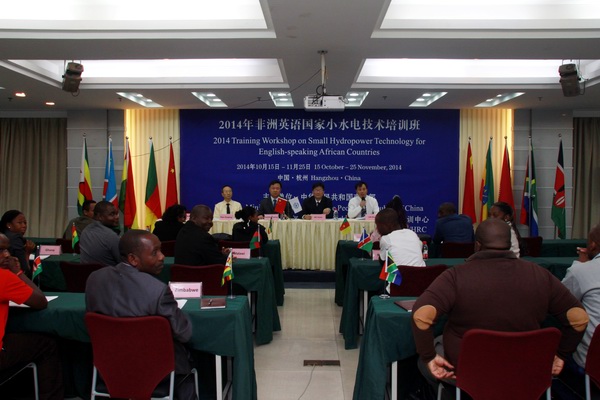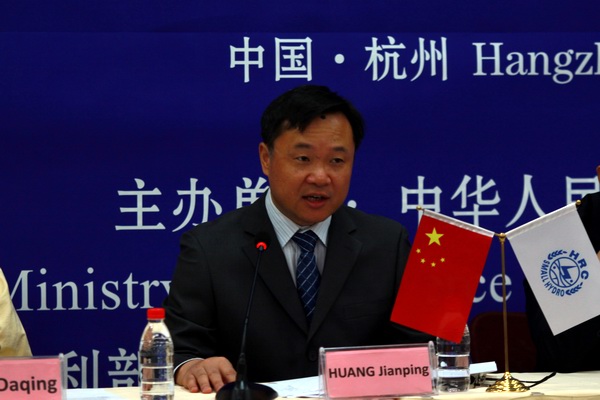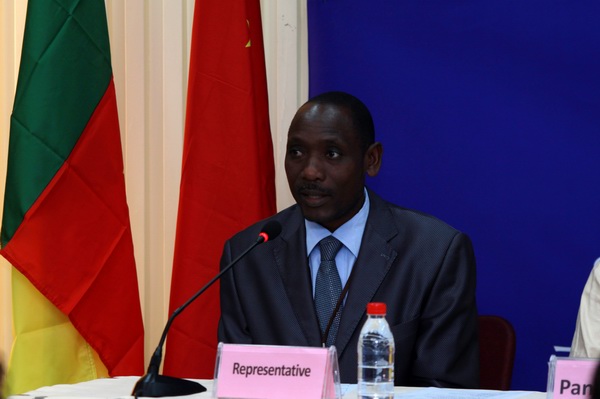---Entrusted by the Ministry of Commerce
(MOFCOM), HRC conducts the 2014 Training Workshop on SHP
Technology for English-speaking African Countries from
15 October to 25 November. Nearly twenty officials and
technicians from around ten African countries, i.e. Cameron,
Ethiopia, Ghana, Malawi, Mauritius, Namibia, South Africa,
Tanzania, Zimbabwe, came to attend this training workshop.
The opening ceremony of the training
workshop was held at the multifunctional hall of HRC.
Deputy Directors of HRC, Mr. Huang Jianping and Mr. Xie
Yimin were present, extending their warm welcome to all
the participants who came all the way here for the significant
event.
In his speech, Deputy Director Huang
reviewed the visit of Chinese Premier Li Keqiang to Africa
where he delivered a keynote speech at the 2014 World
Economic Forum on Africa in this May. Premier Li pointed
out, "the African continent is an import birthplace
of the world's civilization. In the last century, this
ancient and fascinating land has seen tremendous changes.
African people have seized the destiny into their own
hands, realized national liberation and state's independence.
Entering the new century, the African economy has shown
great vitality and dynamism ¡¡ Africa is the home to the
largest number of the developing countries, and although
many African countries have seen their economies take
off, they still face tough challenges. China is the world's
largest and most populous developing country, and its
economic aggregate is among the world's top, however it
still trails about one hundred countries in terms of the
UN human development index¡¡" Premier Li also stressed
the importance of the China-Africa cooperation framework.
He called for intensifying cooperation in such areas as
financing, poverty-alleviation, peace and security, and
people-to-people exchanges. He said China will step up
its assistance to Africa and is willing to share its technology
and management experience without conditions.
Here in HRC, the subject of this training
workshop is small hydropower. As a renewable energy universally
accepted by the international society, SHP has been greatly
developed in China with remarkable achievements scored.
The training workshop is designated to provide a platform
for the English-speaking African countries to fully discuss
and communicate in the field of small hydropower development,
focusing on the exchange of updated technology and management
practice. Deputy Director Huang sincerely wished the training
workshop a fruitful success, making the contribution to
the development of SHP and other renewable energies in
the African countries.
Mr. MALAN MANYUNDO, Principal Officer
from the Ministry of Energy and Power Development, Zimbabwe,
delivered a speech on behalf of all the participants:
"¡¡. Allow me, on behalf of the participants to commend
your highly esteemed government's offer to sponsor and
share with African governments represented here, the Chinese
experiences in small hydropower development. Let me also
warmly commend HRC's hospitality to the participants.
Your unwavering support to African governments in all
spheres of economic development is highly appreciated
¡¡The challenges which are common in most African countries
with regards to small hydropower and other renewable energy
development emanate from how policies are implemented.
These challenges can be specified as follows: Lack of
awareness; Lack of funding; Resistance to technological
changes; Lack of expertise and skills in the field of
renewable energy management; Lack of energy efficiency
standards; Use of obsolete technology and equipment; Uneconomic
or too low renewable energy tariffs, where they exist,
otherwise there might not be any renewable energy feed-in
tariffs; Government's direct interference in the regulation
and operations of the sector; Corruption; There is policy
implementation inconsistence, where there is a policy;
Regulation of renewable (including SHP) energy sector
i.e. licensing is done on unsolicited bids, a scenario
that may not be compatible with the existing national
grid capacity; Underestimated potential of the SHP resource;
Fragmented statutes or laws that govern the renewable
energy sector¡¡ it is expected that the lectures and field
visits that will be conducted will give a hint on how
to address these challenges¡¡On behalf of my government
and on behalf of the participants I take this opportunity
to kindly encourage the lecturers to take us through the
complex issues surrounding the implementation and management
of small hydropower programs so that we may improve on
what we are already doing in our respective countries.
"
During the coming 6 weeks, informative
presentations will be delivered to the participants and
field visits will be paid to typical power stations and
equipment manufacturers of small hydropower, wind power
and solar energy. Moreover, in-depth discussions will
be organized cordially among HRC professionals and all
the participants, with concerns about the further international
cooperation on the development of SHP and other renewable
energies. (2014-10-21)





